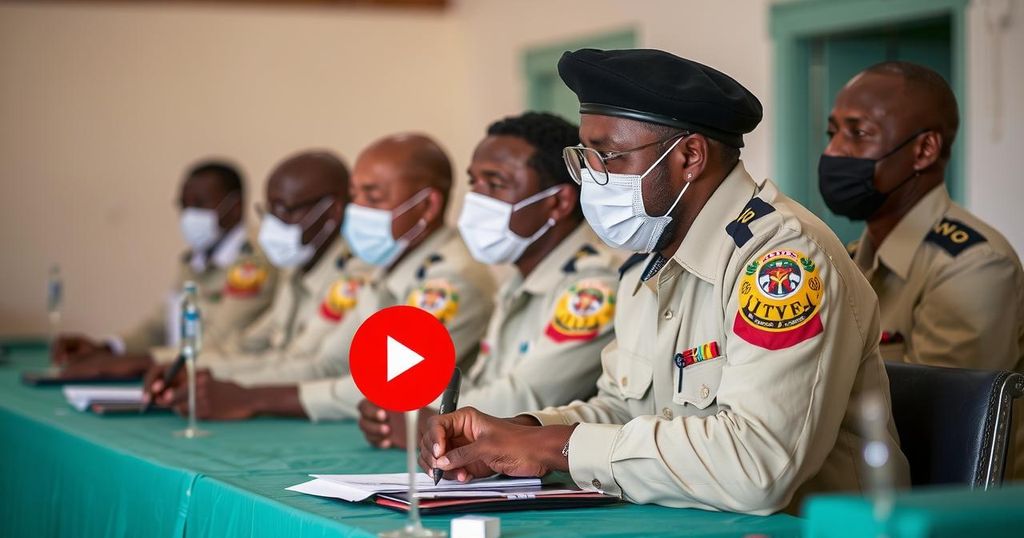Chad’s Electoral Commission Seeks Military Protection Amid Election Violence

Chad’s electoral commission has implored military aid to protect election officials and candidates as violence escalates ahead of the December 29 elections. Opposition groups have attacked ruling party rallies, and over 75 parties label the elections a facade to consolidate power. There’s a significant number of registered voters and candidates, but trust in the electoral process remains low amidst concerns of manipulation by the ruling party.
Chad’s electoral commission has requested military assistance to safeguard election officials and candidates in light of increased violence leading up to the elections scheduled for December 29. Observers report that opposition supporters have resorted to using clubs and iron bars to obstruct the ruling MPS party’s campaign rallies in various cities. The National Election Management Agency (ANGE) has highlighted the challenges faced during the campaigning period, as candidates and election officials have come under attack during rallies. The elections aim to conclude a three-year transitional phase that commenced following the passing of long-serving President Idriss Deby Itno in April 2021.
The Vice President of ANGE, Assane Bairra, warned that the current tensions could escalate into armed conflict unless military personnel are deployed. With more than 8.3 million out of 18 million eligible voters registered, the upcoming elections are set to feature approximately 1,300 candidates representing 180 political parties. Additionally, over 1,000 election observers have been accredited to monitor the polls. However, a coalition comprising over 75 opposition parties and civil society organizations has condemned the elections as a “masquerade,” asserting that President Mahamat Idriss Deby Itno intends to utilize these elections to strengthen his authority.
Protests have erupted in several towns such as Ndjamena, Bongor, Abeche, Lai, and Moundou, where opposition supporters employed violent tactics against MPS campaign convoys. In response, the military has intervened to eradicate roadblocks erected by opposition parties that hinder MPS campaign access. Avocksouma Djona, the president of the Party of Democrats in Chad, indicated that his party is advocating for a postponement of the elections, claiming that all officials in charge of the electoral management body were appointed by the late President Deby, who also controls the constitutional court and directs its outcomes.
President Deby expressed to state television that the elections would facilitate Chad’s transition back to civilian governance in a fair and transparent manner. Nonetheless, opposition factions dismissed these assertions, contending that the Chadian leader seeks to manipulate the elections to retain parliamentary authority. Having assumed the role of transitional president in April 2021 following the death of his father, Deby has extended the promised transition twice, culminating in his election during disputed polls in May 2023, which many opposition parties boycotted due to concerns over electoral integrity.
Chad has been navigating a complex political landscape since the passing of its longstanding leader, Idriss Deby Itno, in April 2021. The transitional government, led by his son, Mahamat Idriss Deby Itno, is attempting to restore civilian rule through upcoming parliamentary elections. Amidst intense political rivalry and unrest, concerns regarding the fairness and transparency of the electoral process have emerged, exacerbated by instances of violence and intimidation from opposition supporters toward the ruling party. The government’s attempts to maintain order and ensure a smooth electoral process are compounded by a divided political climate, leading to widespread mistrust in the electoral institutions.
In conclusion, the approaching elections in Chad are overshadowed by rising violence, political mistrust, and claims of electoral manipulation. The military’s involvement in safeguarding the electoral process reflects the heightened tensions and potential for conflict. As nearly 180 political parties prepare for the elections, the maneuvering by opposition factions and concerns regarding the legitimacy of the electoral bodies cast a shadow over the potential for a successful transition to civilian governance. The outcome of this electoral exercise will be pivotal in shaping Chad’s political future and stability.
Original Source: www.voanews.com







